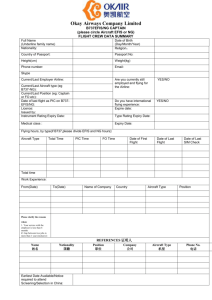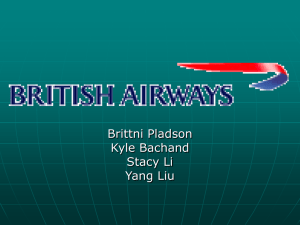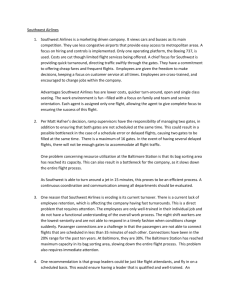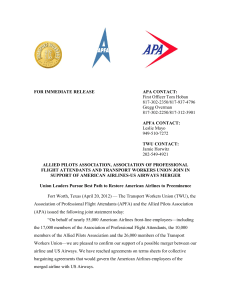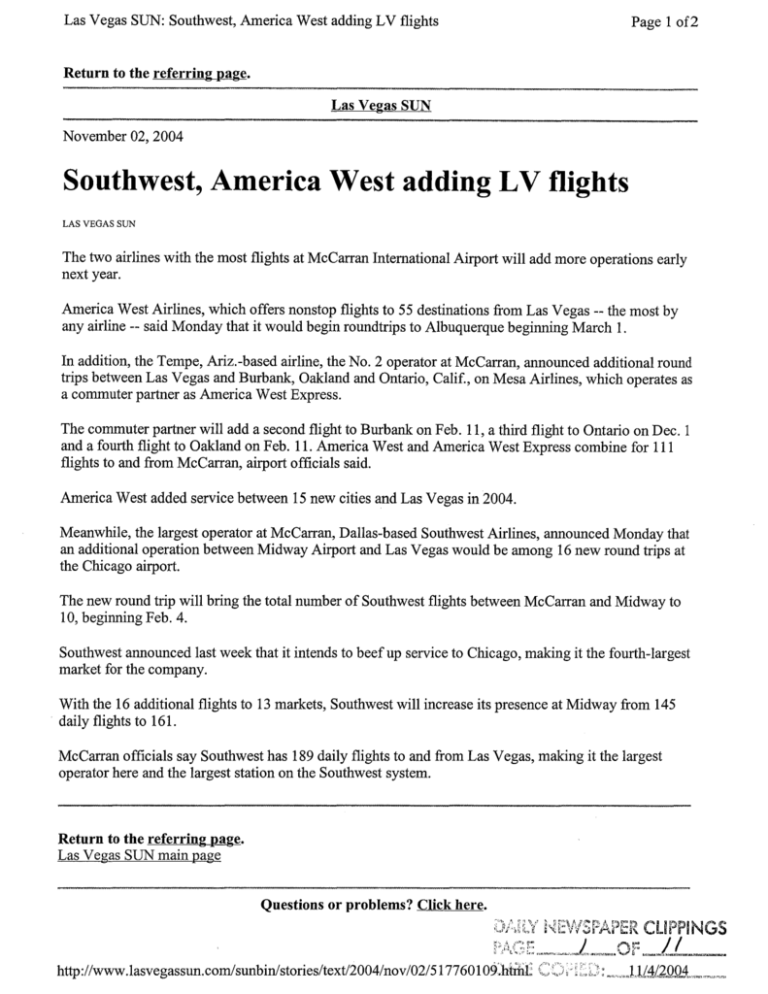
Las Vegas SUN: Southwest, America West adding LV flights
Page 1 of2
Return to the referring page.
Las Vegas SUN
November 02, 2004
Southwest, America West adding LV flights
LAS VEGAS SUN
The two airlines with the most flights at McCarran International Airport will add more operations early
next year.
America West Airlines, which offers nonstop flights to 55 destinations from Las Vegas the most by
any airline said Monday that it would begin roundtrips to Albuquerque beginning March 1.
--
--
In addition, the Tempe, Ariz.-based airline, the No. 2 operator at McCarran, announced additional round
trips between Las Vegas and Burbank, Oakland and Ontario, Calif., on Mesa Airlines, which operates as
a commuter partner as America West Express.
The commuter partner will add a second flight to Burbank on Feb. 11, a third flight to Ontario on Dec. 1
and a fourth flight to Oakland on Feb. 11. America West and America West Express combine for 111
flights to and from McCarran, airport officials said.
America West added service between 15 new cities and Las Vegas in 2004.
Meanwhile, the largest operator at McCarran, Dallas-based Southwest Airlines, announced Monday that
an additional operation between Midway Airport and Las Vegas would be among 16 new round trips at
the Chicago airport.
The new round trip will bring the total number of Southwest flights between McCarran and Midway to
10, beginning Feb. 4.
Southwest announced last week that it intends to beef up service to Chicago, making it the fourth-largest
market for the company.
With the 16 additional flights to 13 markets, Southwest will increase its presence at Midway from 145
daily flights to 161.
McCarran officials say Southwest has 189 daily flights to and from Las Vegas, making it the largest
operator here and the largest station on the Southwest system.
Return to the referring page.
Las Vegas SUN main page
Questions or problems? Click here.
~L
http //www lasvegassun comlsunbrnlstories/text/2004/nov/02/5 17760109 htmL ~
r~?Ep
L
CUPP~NGS
U/4/2~)Q4
reviewjoumal.com
--
Business: In Brief
Page 1 of3
S
I~3artmenIscanL.
G€t what you want.
J_!eiectastatP ~
reviewjcurnalcorn
€~
PRINTTHIS
Thursday, November 04, 2004
Copyright © Las Vegas Review-Journal
In Brief
DALLAS
American Airlines will cut more jobs
American Airlines, struggling to compete with lower-overhead carriers, will cut more jobs to reduce
costs, chiefexecutive Gerard Arpey said Wednesday.
The companyhad already disclosed that it would lay offup to 650 mechanics and 450 pilots, as CEO
Gerard Arpey reminded investors during a meeting in New York.
AMR would have made money in the third quarter if fuel prices had remained at last year’s levels. Arpey
said Wednesday that American would pay about $500 million more for fuel in the fourth quarter than it
did during the same period last year.
DA~LYNEWSPAPER CUPP~NGS
~:r i(~
DATE ~
USATODAY.com Morejob cuts seen at American Airlines
Page 1 of2
-
€~
PRINTTHIS
Powered by
~Cidak~Iity
More job cuts seen at American Airlines
DALLAS (AP) American Airlines, struggling to compete with lower-overhead
carriers, will cut more jobs to reduce costs, chief executive Gerard Arpey said
Wednesday.
The company had already disclosed that it would lay off up to 650 mechanics and 450 pilots, as CEO Gerard
—
Arpey reminded investors during a meeting in Fort Worth.
“We will see more cuts across the board, all workers, in the months ahead,” Arpey added.
American and other carriers are losing money as they are squeezed by high fuel costs and tough competition that
makes it hard to raise fares. American’s Fort Worth-based parent, AMR, reported recently that it lost $214 miNion
in the July-September quarter and expected an even bigger loss in the fourth quarter.
AMR would have made money in the third quarter if fuel prices had remained at last year’s levels. Arpey said
Wednesday that American would pay about $500 million more for fuel in the fourth quarter than it did during the
same period last year.
“Were it not for Exxon getting most of our money this year, we would have been able to make some progress,” he
said.
Arpey also blamed the airline industry’s problems on carriers continuing to add seats for sale, which has
depressed fares. American has joined in the rush
increasing capacity by 2.3% in October, although traffic rose
more, up 9.1%.
—
UAL Corp.’s United, Delta Air Lines Inc. and Continental Airlines Inc. all raised capacity in the third quarter
compared to a year earlier.
“You would think these were very robust times for the airline industry,” Arpey said.
American has said it would cut its U.S. flight schedule by 5% early next year.
On another issue, Arpey, who is also chairman and CEO of AMR, said the parent company was still considering
selling its investment subsidiary and the commuter airline American Eagle. He added, however, that commuter
carriers are profitable while most of the so-called mainline airlines are losing money.
Copyright 2004 The Associated Press. All rights reserved. This material may not be published, broadcast,
rewritten or redistributed.
Find this article at:
http://www.usatoday.com/travel/news/2004-1 1 -04-aa-cuts_x.htm
~
~(
P~FE~’~
C~1L~P~(~S
Flight attendants pessimistic for pact PittsburghLlVE.com
Page 1 of3
-
Pittsburgh~b~OI~
PITT SBURGH
TRIBUNE-REVIEW
Flight attendants pessimistic for
pact
Tools
Print this article
E-mail this article
.
Subscribe to this pg.per
By Steve Haivonik
TRIBUNE-REVIEW
Thursday, November 4, 2004
?TT
L arge r/S
Je Text
____________________
New concession demands have vIrtually killed any
chance of US Airways negotiating a new cost-savings
contract with its 5,800 flight attendants, union leaders
said Wednesday.
~
.
~
~P~”
toyourlocal
rn~sp~per
“We just got backed into a corner,” said Teddy Xidas, president of Association
of Flight Attendants Local 40 in Pittsburgh.
According to Mike Flares, president of AFA Local 89 in Charlotte, N.C., US
Airways had initially sought $116 million a year in concessions in a new labor
agreement. The target included about $51 million in savings from termination of
the union’s defined-benefits pension plan.
On Tuesday, US Airways presented the flight attendants union with a new
proposal that sought about $100 million in concessions in addition to the $51
million in pension savings.
--
The union says this represents a 29 percent increase in the company’s
demand, because US Airways no longer wants to give the flight attendants
union any credit if it succeeds in getting U.S. Bankruptcy Judge Stephen S.
Mitchell to terminate their defined-benefits pension plan.
“I can’t see any agreement coming out of this latest proposal,” Flares said.
Two other unions, representing mechanics and customer service agents, have
expressed similar pessimism about reaching negotiated settlements with the
company setting up a management-labor showdown that could plunge the
troubled airline into liquidation.
--
The Communications Workers of America, which represents about 6,000
customer service agents, has threatened to go on strike if US Airways asks
Mitchell to void its existing labor contracts in mid-November. The company has
said that a strike could lead to an immediate and permanent shutdown.
US Airways, the nation’s seventh-largest airline, is seeking $650 million in wage
and benefits cuts from three unions, representing about 24,000 workers, as part
.~
LY’ N ~WS~A
ftR CU ~ NG~
PAGE
~OF
http://www.pittsburghlive.comlx/tribune-review/business/print_2691 62.h~i~JE
COP~~D
Q~S4~
Flight attendants pessimistic for pact PittsburghLlVE.com
Page 2 of3
-
of a $1.5 billion cost-cutting transformation into a profitable low-cost carrier.
US Airways has pushed hard to negotiate new cost-saving labor contracts. But
many employees are angry and unwilling to grant more concessions since
Mitchell imposed emergency 21 percent pay cuts an Oct. 15.
The airline met with negotiators from the International Association of Machinists
and Aerospace Workers, which represents about 4,500 mechanics, the past
two days. It is scheduled to meet today with representatives of the
Communications Workers of America, which represents about 6,000 customer
service agents.
So far, however, neither union has reported significant progress.
The only union that has reached agreement has been the Air Line Pilots
Association, which last month ratified a new contract that will save US Airways
more than $300 million a year.
lAM and CWA leaders had said that US Airways’ concession demands were so
high as to preclude negotiated settlement.
“What incentive is there to vote for a contract that’s going to put us out of
work?” said Chris Fox, president of CWA Local 13302 in Pittsburgh.
Unlike the mechanics and customer service unions, the AFA had been quietly
optimistic that it could join the pilots in reaching a consensual agreement with
the company. Union leaders had said they would send a tentative agreement to
the rank and file for a ratification vote next week.
Their optimism evaporated on Tuesday when US Airways presented a new
proposal that seeks pay cuts of 15 percent for present workers and a separate
pay scale for new hires that tops out at $24,000 a year.
“They’re asking us to negotiate away our jabs,” Flares said.
Xidas said the company’s new target was unreachable.
“We really don’t know what we’re going to do,” she added.
Contract talks will be the primary topic when the flight attendants’ Master
Executive Council holds a three-day meeting in Pittsburgh next week.
US Airways’ need to quickly complete its transformation plan was underscored
by its October passenger statistics, released yesterday.
The airline said that its passenger load factor was 75.6 percent, a record for
October and a 3 percent increase from the same month a year earlier.
However, it said that mainline passenger unit revenue declined by 7.5 to 8.5
percent, compared with October 2003. The decline reflects downward pressure
on US Airways’ ticket prices as a result of increased competitio~$~j~y?
~
http //www pittsburghhve com!x/tribune-review/business/print_269 162 html
,
3
CL~PNGS
11/4/2004
Flight attendants pessimistic for pact PittsburghLlVE.com
Page 3 of3
-
carriers.
According to documents filed in U.S. Bankruptcy Court in Alexandria, Va., the
Allegheny County Airport Authority is demanding that US Airways announce
any change in its plan for gate leases by Jan. 20. The airline, which signed
long-term leases for 10 gates 10 months ago, wants until April 30 to make its
decision.
Recently filed documents indicate that US Airways will pay its new chief
financial officer, Ronald Stanley, $317,000 a year plus a signing bonus of
$16,667 a month for six months.
Stanley, 57, replaces David Davis, who will leave US Airways at the end of this
month to join a chemical company in Houston. Davis received $289,000 in
salary and bonuses during the past year.
Steve Halvonik can be reached at shalvonik@tribweb.com or (412) 320-7993.
“U
‘I
LI ‘v~£
Reproduction
Images and ortext
reuse
copyright
prohibited
© 2004
without
by The
written
Tribune-Review
consent fromPublishing
PittsburghLlVE.
Co.
DAft’( NEWSPAPER CUPP~NGS
http://www.pittsburghlive.comlx/tribune-review/buSifless/Priflt_269 1 62;htm.l
reviewjournal.com -- News: Reno airport running again after delays
reviewjournal.com
Page 1 of 1
€d~PRINTTHIS
Thursday, November 04, 2004
Copyright © Las Vegas Review-Journal
Reno airport running again after delays
REVIEW-JOURNAL
RENO Flights resumed Wednesday night at Reno-Tahoe International Airport after the Federal
Aviation Administration repaired equipment that had caused numerous delays and cancellations over
more than five hours.
--
All arrivals and departures were halted about 2:30 p.m. because of a malfunction in the equipment used
when visibility is poor and pilots are forced to use instrument landing systems, airport spokeswoman
Heidi Berthold said.
Inbound and outbound flights were cleared to resume at 8 p.m. Wednesday, she said.
Nevertheless, travelers were advised to contact their airline before heading to the airport today because
of the possibility of further delays from a backlog of flights, she said.
More than a dozen flights were canceled or delayed before the malfunction was repaired.
Find this article at:
http://www.reviewjournal.com/lvrj_home/2004/Nov-04-Thu-2004/news/25175028.html
E check the box to include the list of links referenced in the article.
h
DA~LY NEVJSPA~~E~
CLLRNCS
P,~~3E
~7~or
L~_
The New York Times
~1yc
~
>
Business
>
Airlines Fearing a Vicious Circle of Weak Finances a... Page 1 of4
PR~ER~Rl~NULY
FORMAT~
n yti me s.c 0 m
S~WSORE~J
~iuckabees
U~~EW~T
1m~skffH
November 3, 2004
Airlines Fearing a Vicious Circle of Weak Finances and Low
Morale
By CLAUDIA H. DEUTSCH
I
t is a management truism that low morale among workers inevitably results in low productivity, low
quality, erosion of customer loyalty, and ultimately, lower profits. And US Airways employees, who
have seen theirpay cut by more than 20 percent and theirhealth insurance and pension plans shrink, are
certainly an unhappy lot.
“People are still giving 110 percent, but they are being totally beaten down,” said Francis I. Smith, 53, a
24-year employee who handles spare-parts inventories in Pittsburgh.
Even if they were slouching on the job, would it matter? These days, passengers are more likely to
comb the Internet for cheap, convenient flights than to patronize a favorite airline. Thus, if smiling
employees and squeaky-clean planes no longer woo repeat business, would scowling employees and
dirty planes drive it away?
“I’m not sure that employee morale is so important anymore,” said Timothy M. Ghriskey, chief
investment officer of Solaris Asset Management. “Air travel has become a commodity, and passengers
make their decisions on who’s got the cheapest fare, not on whose employees are the friendliest.”
Still, management experts say the miasma of gloom will probably take a toll, not just at US Airways,
but at Delta, United and at most other airlines.
“Passengers can sense the attitudes, the emotion, the stress, and it carries over to their tangible
impression of the company,” said Jolm D. Kasarda, a professor of management who specializes in
airlines at the Kenan-Flagler Business School ofthe University ofNorth Carolina.
The biggest question for US Airways is whether it can survive the bad morale before the bad morale
helps do it in. Company executives say they are taking steps that will improve working conditions and
profitability.
For now, the airline seems to be hanging on. On a recent Monday afternoon, for example, Barry S. Levy
flew the US Airways shuttle from Boston to La Guardia. The flight, he said, was remarkable for its
unremarkability. It took off on time, flight attendants were pleasant, and customer service
representatives in New York helped him book a contingency return flight on Delta, in case he missed
the last shuttle home.
“Everyone was professional, everyone was courteous,” Dr. Levy said. “You would never have known
the airline was in bankruptcy.”
~
PAGE
http ://www.nytimes.coniI2004/1 1/03/business/O3air.html?pagewanted
~ ~
~LJ~~
OF
T~pQ~s~t4pn~11/4/2004
The New York Times
>
Business > Airlines Fearing a Vicious Circle of Weak Finances a... Page 2 of4
Indeed, US Airways employees seem almost proud that they are keeping their personal woes from the
outside world. Dianne Fogarty, a US Airways flight attendant with 33 years of service, has lost pay and
vacation days and said she was resentful that, in her view, management sees her as only “a dollar sign.”
Nonetheless, she said, “they will not take my work ethic, my sense of humor or my smile.”
While service may not be slipping, worker productivity may be a thornier issue. It is difficult to
quantify flight times and schedules are out of employee control, as are delays at congested airports.
Still, there is anecdotal evidence that some pilots have slowed their planes and that some employees
have been calling in sick more often, either out of anger or a practical desire to use up sick days before
they lose them.
-
Moreover, pilots, flight attendants and tarmac workers express a mounting anger at a management they
say blames employees for the company’s woes at the same time that it hampers their productivity by
scheduling flights that keep them waiting for hours, often without pay.
Some contend that the airline left the field open to low-cost competitors when it eliminated direct
flights from La Guardia to Florida in 2002 - flights the airline may reinstate.
Kevin Cogley, a maintenance mechanic in Pittsburgh with 15 years service, argued that programs US
Airways has installed to reorder parts automatically, keep track of employee time and outsource
maintenance have all served to reduce efficiency, not enhance it.
“The hourly employees have told management for years that there was waste, but management has
always taken the attitude that ‘father knows best,’ “he said.
US Airways officers vigorously dispute that. Christopher L. Chiames, senior vice president for
corporate affairs, said management had used employee meetings, newsletters, Web casts and intranet
chats to keep employees informed and to solicit suggestions.
“I go out in the field, and I hear employees saying, The company never tells us anything,” Mr. Chiames
said. “Well, we try, in every way, to explain that we’re not just looking to employee pay cuts as the
answer.”
Still, airline experts say employee complaints are not totally unfounded. Many note that even though
labor costs at Southwest Airlines are a high percentage of operating costs, the airline is solidly
profitable.
These experts say that Southwest employees are generally younger, less demanding on compensation or
on the privileges of seniority, and most important, more willing to accept management work rules,
largely because they do not feel that management is clamping down on employee freedom to cover up
its own incompetence or on compensation to pad its own pockets. “Southwest treats its employees as a
source ofvalue, not of cost, so they work to turn planes around faster and are flexible,” said Jody Hoffer
Gittell, an assistant professor of management at the Heller School for Social Policy and Management at
Brandeis University, who has written extensively about airlines. “US Airways’ biggest mistake is to
view employee costs as the reason forits current troubles and the primary method to extricate itself
from them.”
With airlines cutting jobs, many US Airways employees say they see few alternatives to picking up the
slack for those who have quit or call in sick. For example, US Airways has been shuttling members of a
slimmed-down maintenance staff among airports. Employees are angry, but acquiescent.
DA~LV ~ ~
~
~ ~ L~!~
PAGE~I~~~.
http://www.nytimes.com/2004/1 1/03/business/03air.html?pagewanted~q~•~)
11/4/2004
N~
The New York Times
>
Business > Airlines Fearing a Vicious Circle of Weak Finances a... Page 3 of4
“It was either take the layoff or go where your seniority will hold,” said Norbert Schwartzmiller, 31, a
maintenance worker from Pittsburgh who is now assigned to the Philadelphia airport.
Few employees have the luxury of quitting. Take Mary Blosser, who has spent 19 years as a US
Airways flight attendant. Without much technology training, Ms. Blosser said, changing careers is not
easy. “We still enjoy the job,” she said, “but everything has made it more difficult.”
For others, the enjoyment is long gone, along with the high pay. “Management is real bad,” said Eyob
Gebremedhin, 29, a ramp worker at Reagan National Airport with six years of service. “They don’t do
nothing.”
Some things, of course, are out of management’s control. In addition to soaring fuel costs, US Airways
and the other airlines are also facing fare-shopping passengers who fly low-cost start-ups like JetBlue.
Moreover, greater congestion at hub airports like O’Hare in Chicago and La Guardia has forced planes
to waste fuel in taxiing and circling and has slowed the turnaround of planes.
US Airways also has problems beyond those of its rivals. It concentrates on short domestic flights,
rather than more profitable international routes. Four years ago, when other airlines were installing
electronic passenger counters and other upgraded systems, US Airways was pursuing a merger with
United Airlines; when that merger fell apart, US Airways was left with antiquated systems that it never
replaced. The airline also gave up some lucrative routes to assure the government that the merger would
not reduce competition.
In fact, some employees say that their concessions to management have made things worse. Without
“the economic sword of Damocles” hanging over them, “management will rise to the lowest level of
performance and not schedule efficiently,” said Eddie Hofthian, 50, a pilot who has worked at US
Airways since 1978. He said his time was “not carefully husbanded but carelessly wasted.”
Mr. Hoffman acknowledges that the airline is trying new strategies, like adding profitable Caribbean
routes. But he remains angry. He says his questions for management is, What took you so long?
Management experts say US Airways apparently has done a poorjob of internal communications. “It
would help if they say, ‘Here’s what we’ve done to improve things before cutting pay, do you have ideas
for what else we can do?’ “ said Austan D. Goolsbee, professor of economics at the University of
Chicago Graduate School of Business.
US Airways insists it has been doing just that. Mr. Chiames said the airline had reworked its schedules
to add 200 daily flights in February without adding more planes and had identified more than $100
million in ticket distribution savings, by replacing travel agents and sales clerks with Web-based ticket
sales.
He said that US Airways was asking only for things that employees at low-cost rivals provide. “We’d be
crazy not to acknowledge that our employees are frustrated and angry, and that theirjobs aren’t as
glamorous anymore,” he said. “But they have to understand, JetBlue hires ticket agents for $9 an hour
while many of ours already make $20.05, and Southwest’s flight attendants have always cleaned planes
between flights.”
In interviews, employees often complained about what they saw as gaping discrepancies between their
paychecks and those ofmanagement, even after a recent 20 percent pay cut for managers. Although
business experts say US Airways needs to maintain current levels of executive salaries to attract and
~~
http //www nytimes com/2004/1 1/03/business/O3air ~
PAGE
~
~‘~‘[~ ~
(~ //
1 1747ZOO~”~
The New York Times
>
Business > Airlines Fearing a Vicious Circle ofWeak Finances a... Page 4 of4
keep talent, employees are not mollified. They are particularly angry that Bruce R. Lakefield, the chief
executive, is keeping his $425,000 salary.
“I can’t handle someone who makes $400,000 telling me to take a 21 percent pay cut,” said a flight
attendant who said she made about $24,000 last year and now lives paycheck to paycheck.
Not all employees blame management exclusively fortheir plight. Kirk Conners, 57, a customer service
representative in Detroit with 36 years seniority, say he is also mad at President Bush for not dipping
into the strategic petroleum reserves to curb fuel prices, and at the industry as a whole for not raising
ticket prices.
“The price ofairline fuel has gone up, but the price of tickets has not,” he said. “How much can they cut
employees’ wages to subsidize fuel costs? When does it end?”
Reportingfor this article was contributed by Jeremy W. Peters in Detroit, Eric L. Dash in Pittsburgh
and New York and Kristen A. Lee in Washington.
I
Copyrioht 2004 The New York Times Company ii~rn~
Privacy Policy
Search Corrections RSS
L~J,~(~
Back to Top
~
~
http //www nytimes com/2004/1 1/03/business/O3air html9pagewanted~pr1fit~pOs1tion~
~
11/4/2004

